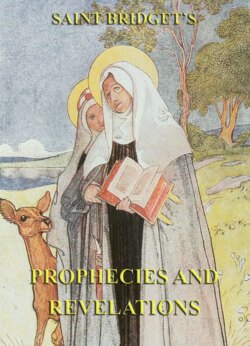Читать книгу The Prophecies and Revelations of Saint Bridget of Sweden - Saint Bridget of Sweden - Страница 42
На сайте Литреса книга снята с продажи.
Chapter 39
ОглавлениеThe Son of God said: “I had three things in my death: First, faith, when I bent my knees and prayed to the Father, knowing that he was able to save me from the suffering. Second, hope, when I steadfastly waited and said: ‘Not as I will.’ Third, love, when I said: ‘Thy will be done.’ I also had bodily agony from the natural fear of suffering when the sweat of blood went out of my body. Thus, in order that my friends should not fear that they are abandoned when the moment of tribulation comes to them, I showed them in myself that the weak flesh always flees from suffering.
But now you may ask how the sweat of blood went out of my body. Just like the blood of a sick person dries up and is consumed in all his veins, so was my blood consumed by the natural fear of death. My Father wanted to show the way by which Heaven would be opened and the exiled man to be able to enter therein, and therefore he delivered me out of love to my suffering in order that my body would be glorified in honor after the suffering had been fulfilled. For justice did not allow my Manhood to enter into glory without suffering, although I was able to do so by the power of my Divinity.
How then should those deserve to enter into my glory who have little faith, vain hope, and no love? If they believed in the eternal joy of Heaven and in the horrific torments of hell, they would desire nothing but me. If they believed that I see and know all things and have power over all things and that I demand a judgment over all, they would hate the world, and they would fear more to sin before me than before men. If they had a firm and steadfast hope, then their every thought and desire would be directed toward me. If they had a divine love for me, then they would at least think in their soul about what I did for their sake, how much I labored in preaching, how great my pain was in my suffering and how great my love was at my death when I preferred to die rather than to lose and forsake them.
But their faith is sick and wavering, threatening to fall soon, because they believe only when suffering and temptation does not attack them, and they lose their hope as soon as they are met with adversity. Their hope is vain, because they hope that their sin will be forgiven without justice and a right judgment. They hope with self-reliance to receive the kingdom of Heaven for nothing and wish to receive my mercy without the severity of justice. Their love for me is completely cold, for they are never enkindled in seeking or calling me unless they are forced to it by tribulation. How can I be warmed by such people who have neither a right faith nor a firm hope nor a burning love for me?
And therefore, when they cry out to me and say ‘O God, have mercy on me’, they do not deserve to be heard or to enter into my glory since they did not want to follow their Lord in suffering, and, therefore, they should not follow him to the glory. For no knight can please his Lord and be taken back into his mercy after his fall, unless he first humbles himself in penance for his contempt.”
Our Creator asks three questions of his bride. The first is about the servitude of the husband and the dominion of the wife; the second about the work of the husband and the spending of the wife; and the third about the contempt of the Lord and the honoring of the servant.
